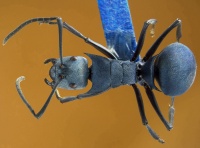Polyrhachis baca
| Polyrhachis baca | |
|---|---|

| |
| Scientific classification | |
| Kingdom: | Animalia |
| Phylum: | Arthropoda |
| Class: | Insecta |
| Order: | Hymenoptera |
| Family: | Formicidae |
| Subfamily: | Formicinae |
| Tribe: | Camponotini |
| Genus: | Polyrhachis |
| Subgenus: | Myrma |
| Species: | P. baca |
| Binomial name | |
| Polyrhachis baca Sorger & Zettel, 2010 | |
The type collection, the only known material, was found in a degraded dipterocarp forest on a mountain slope.
Identification
A member of the Polyrhachis cyaniventris species-group. Sorger & Zettel (2010) - Polyrhachis baca differs from Polyrhachis cyaniventris in sculpture on mesosoma and gaster; from Polyrhachis pirata in size and colour of mesosoma; and from both species in shape of pronotal spines and setiferation.
Keys including this Species
Distribution
Only known from the type locality in Central Luzon.
Latitudinal Distribution Pattern
Latitudinal Range: 12.766089° to 12.766089°.
| North Temperate |
North Subtropical |
Tropical | South Subtropical |
South Temperate |
- Source: AntMaps
Distribution based on Regional Taxon Lists
Indo-Australian Region: Philippines (type locality).
Distribution based on AntMaps
Distribution based on AntWeb specimens
Check data from AntWeb
Countries Occupied
| Number of countries occupied by this species based on AntWiki Regional Taxon Lists. In general, fewer countries occupied indicates a narrower range, while more countries indicates a more widespread species. |

|
Estimated Abundance
| Relative abundance based on number of AntMaps records per species (this species within the purple bar). Fewer records (to the left) indicates a less abundant/encountered species while more records (to the right) indicates more abundant/encountered species. |

|
Biology
Castes
Nomenclature
The following information is derived from Barry Bolton's Online Catalogue of the Ants of the World.
- baca. Polyrhachis (Myrma) baca Sorger & Zettel, 2010: 32, figs. 1-3 (w.) PHILIPPINES (Luzon I.).
Unless otherwise noted the text for the remainder of this section is reported from the publication that includes the original description.
Description
Worker
Holotype. TL 8.6 mm, HW 2.00 mm, HL 2.48 mm, CI 81, SL 2.85 mm, SI 142, PSPD 2.44 mm, PPL 0.95 mm, PPW 1.16 mm, PPI 122, PTW2.33 mm, MTL 2.90 mm.
Head with greenish blue shimmer, mesosoma, petiole and gaster with dark bluish shimmer. Legs and antennae with greenish blue shimmer. Head finely puncturated. Venter of head with 10 setae located mostly on outer margins. Vertex with 10 setae. Frons with fine median furrow and 5 setae. Genae without setae (a few setae right on margin with venter not counted). Clypeus on disk with 10 setae. Mesosoma dorsally without setae, microsculpture puncturated. Pronotal spines gracile, in cross-section rather flat, their bases slightly elevated over anterior pronotal disk. Propodeum with dorsal and posterior face separated by almost straight ridge. Sides of propodeum dorsal of stigma with some fine longitudinal rugae overlaying microsculpture. Femora with 4 setae, tibiae without setae. Gaster with isodiametric reticulum and numerous setae (6 on tergite 1, 9 on tergite 2) increasing in length and number towards apex of abdomen.
Type Material
Philippines, Luzon Island, Laguna Province, Los Baños, on northern slopes of Mount Makiling (alternative spelling: Maquiling), Mud Springs (area name), ca. 650 m a.s.l., N 14° 07', E 121°11', in degraded dipterocarp forest. Holotype (worker) labelled "PHILIPPINES, Luzon\ 13 ii 1999, Laguna,\ Los Baños, Mt. Makiling,\ Mud Springs", ca. 650m,\ leg. Schödl (2)".
Etymology
Baca is the Latin word for “pearl,” here used as a noun in apposition. Besides an obvious similarity in subtle metallic shimmer, the name refers to both, the gracile beauty of this species and the unexpected encounter of the single specimen in the Natural History Museum Vienna.
References
References based on Global Ant Biodiversity Informatics
- Sorger D. M.; Zettel, H. 2010. Taxonomic additions to the Polyrhachis (Myrma) cyaniventris species group (Insecta: Hymenoptera: Formicidae). Annalen des Naturhistorischen Museums in Wien. B, Botanik, Zoologie 111:31-36.
- Sorger, D. M., and H. Zettel. "Taxonomic additions to the Polyrhachis (Myrma) cyaniventris species group (Insecta: Hymenoptera: Formicidae)." Annalen des Naturhistorischen Museums in Wien. B, Botanik, Zoologie 111 (2010): 31-36.

